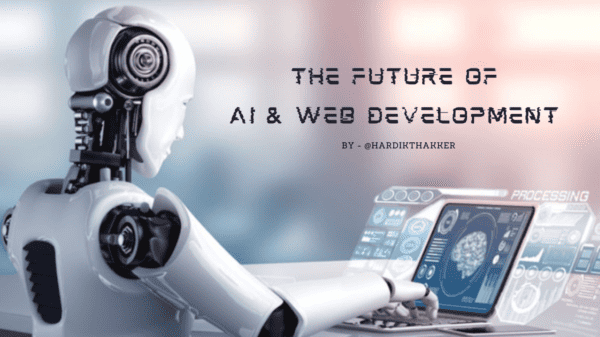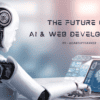All the developments we observe in our daily lives are based on software. Software development technologies have significantly transitioned over the past few years. The software powers everything, from Snapshot’s augmented reality services to Amazon’s drone deliveries. Nearly all emerging technologies have been included by businesses in their software development processes, and artificial intelligence is no different. Artificial intelligence’s impact on software development alters how businesses operate and makes software smarter.
According to a Forrester poll, development and delivery teams are optimistic that using AI software development will enhance development, agile test automation, automation-testing software, and the functionality of RPA bots that use the program as assistance. AI tools are designed to speed up, simplify, and improve software development.
What will happen as AI becomes more integrated into your development cycle? How will the software industry change? How will you use AI to validate code suites that are always improving? Let’s look for answers to all of these queries:
The Function of AI in the Development of Software
We may anticipate a better app being built in the current environment due to AI’s influence on developing applications. Our understanding of AI will shape the future of software development, as most firms today are expressing interest in AI. 80% of businesses are wisely utilizing AI. Nearly 47% of businesses with advanced digital infrastructure have an AI strategy. By 2021, it is expected that just AI tools will generate $2.9 trillion in commercial value.
You should comprehend the role of AI in software development and assess the changes if you wish to implement this method. These are the features that AI can include in software development to give your customers highly customized goods or services.
Impact of AI on Software Development
AI significantly influences software design, code production, and testing. Let’s get into further detail about each topic:
Acquiring Requirements
The requirement collection phase of the SDLC requires the most human involvement because it is conceptual. With the help of artificial intelligence, a variety of methods, and tools, such as Google ML Kit and Infosys Nia, it is possible to automate some tasks and, to some extent, reduce the need for human participation. This stage places a lot of attention on finding gaps before going on to design. Natural language processing is an AI method that enables machines to comprehend user needs expressed in natural language and automatically generate advanced software models. Of course, this strategy has significant drawbacks, such as difficulty balancing the created systems. It is still one of the popular research subjects of today, nevertheless.
Program Design
Planning and developing projects requires specialized knowledge and experience to suggest a concrete answer. Designers have difficulty choosing the right design for each step without making mistakes. Until the client finds the ideal answer, a retract and forward exploring plan drives dynamic adjustments to the design. The most capable approaches for project design may be made possible by automating some complex processes with AI tools. For instance, designers can use AIDA (Artificial Intelligence Design Assistant) to comprehend the client’s demands and want and then use that information to design the ideal project. AIDA is a platform for constructing websites that analyses numerous software design configurations and displays the best-customized design based on the client’s requirements.
Generate Code Automatically
Taking a business idea and writing code for such a large enterprise takes a lot of time and labor. Experts have developed a system that writes code before developing to address the time and cost issues. The method, however, only works well with unknowns like what the target code is intended to perform because gathering these facts takes significantly longer than building code from scratch. The workload will be lessened with AI-assisted intelligence programming.
Imagine that you could convey the project concept to your system in everyday English and have it translated into executable code. Artificial intelligence in software development can change the narrative even when it appears like science fiction! AI tools and natural language processing will make it possible.
Testing Services with AI
Software testing is a vital step in software development, which guarantees the product’s quality. Repeating the same tests can be time-consuming and expensive if specific software testing is done every time the source code is modified. The key takeaway is that software testing benefits once more from AI.
Many tools are available that use AI to develop test cases and conduct regression testing. You may automate the testing with the help of these AI tools, further ensuring error-free testing. A few platforms for testing that use AI and machine learning include Appvance, Functionize, and Testim.io.
Deployment Management
Computer learning The software deployment was also impacted by AI technologies, which improved the effectiveness of deployment control procedures. The deployment phase is the stage in the software development paradigm where developers frequently update the program or apps to newer versions.
There will be a huge danger in running the software if developers don’t carry out a process correctly during an upgrade. AI can shield developers from such flaws during upgrades and lower the likelihood of deployment failure. Artificial intelligence also makes it possible to use machine learning algorithms to analyze the deployment process.
Advantages in AI Software Development
You can see the effects of using AI technology by being aware of its effects and the potential for future advancement in software development. Here are some encouraging outcomes brought about by artificial intelligence’s influence on software development:
Additional Data Security
You can’t ignore software security as a critical characteristic throughout development. The system often gathers information from network sensors and software deployed by the customer. With AI, you may study the data using machine learning to separate anomalies from typical behaviors. By incorporating AI into their development process, software development companies can avoid false notifications, delayed warnings, and alarms.
Identification of Bugs and Errors Becomes Simpler
Coding is improved and made better by combining AI tools. It’s okay for developers and testers to deal with debugging executable files that are full of mistakes. They are better able to identify bugs quickly and fix them.
Develop Better Software by Making Smart Choices
Diego Lo Giudice, according to a Forrester analyst: “Using AI technologies like advanced machine learning (ML), deep learning, natural language processing, and business rules, software developers will be able to build better software more quickly.”
Machine learning solutions can analyze the performance of ongoing initiatives and learn from previous development efforts. AI in software development not only facilitates development but also produces apps with higher quality.
Increasing the Precision of Estimates
AI provides a method for estimating software that entails looking for connections and statistics in historical data from the company’s prior initiatives. It uses business rules and predictive analytics to provide precise estimates of cost, time, and effort.
Overall, Artificial Intelligence will have a big impact on custom software development and design. Software development organizations must understand the influence of artificial intelligence and its possible advantages, not just in terms of how software is developed but also in the program itself. AI in software development will undoubtedly change the game!
Sr.Digital Marketing Executive

























































































































































































